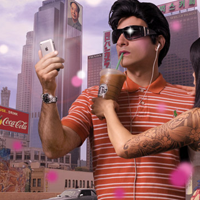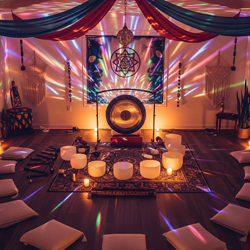Authentic Living in mass society always presents us with issues of personal growth or self-development due to the ingrained influence of mass culture on our mind and behaviour. Until we become more aware of how we are shaped by the mass culture we live in through the mass media and other forces of socialisation, and then continuously practise mindfulness to choose our thoughts and behaviour authentically, the possibilities for authentic living will be challenged. This then limits our personal growth and self-development. This article explores how to identify and break out of the habitual patterns of mass culture using the practice of mindfulness, and how we can end suffering by aligning with our true self and stepping into authentic living.
The Role of Mindfulness in True Freedom
Until we understand how we are influenced by the forces of mass culture, our lives will be largely determined by those forces as we live unconsciously and reactively. This is the case regardless of whether we think we live in a democracy or a free society. In fact, it is irrelevant to our freedom how free or individualistic we think we are if we are not living mindfully, for mindfulness is an absolute requirement for freedom. While we may indeed make individual choices in our lives, they will always be within the confines of the choices given to us by mass culture and mass society—until we expand our consciousness, and thus our choices, with mindfulness.
Mindfulness, the practice of consciously directing our attention in the present moment, without judgement or reactivity, gives us the choice to recognise and change our patterns of thinking, feeling, and behaving, and by extension gives us the choice to accept or reject our conformity to mass culture.
Once we develop our mindfulness practice, we can spot our habitual patterns of thinking and behaving, including how we are living reactively by conforming to the patterns and expectations of mass culture. Then we can question our received choice of thoughts and behaviour and enlarge our choices and freedom by including alternative thoughts and behaviour that derive their value not from the controlling forces of mass society, such as the collective agendas of global corporations, but from the experience of being centred in our true self.
Authentic Living is our Birthright
There is nothing wrong with being an authentic individual and choosing to let go of cultural norms when they don’t serve authentic living. While we may be shaped by our culture, we are not owned by it. Corporations and even governments only exist in the form they do today because we claim a need for them based on the acts and omissions of our existing thoughts and behaviour. They are our collective creation—conscious or otherwise, and derive their substance from the energy we give them. Our society and culture are nothing more than the products of a collective agreement or tradition of interacting. We can at any time choose to live differently and therefore generate new needs and make new collective agreements with people who want the same things as us as part of authentic living.
Granted, some people may not share our decisions to let go of certain cultural norms in favour of living authentically, but our life choices are not their responsibility, and never have been. We need to deal with our own reactivity when we fear other people’s reactions to our choices to embrace new ways of being that align with our deeper truth. We also need to deal with our own reactivity when we fear the uncertainty of life change and letting go of the things that our ego habitually clings to. We can use mindfulness to release this fear. And the more of us who do this, the quicker we can form new supportive communities that honour living from the true self.
Identifying the Habitual Patterns of Mass Culture
With mindfulness we can become aware of the forces within mass culture that shape our habits of reactive living. Everything we think and do we can become aware of as an observer, rather than simply go along with on autopilot. Our practices of daily living, while we are on autopilot and lack mindfulness, may not have anything to do with serving our authentic needs. Sometimes they will serve false, reactive needs. It is therefore important for our authenticity, and for fulfilling our true life purpose, that we weed out inauthentic practices, as they are destined to limit our potential and create suffering. As we make this change for ourselves, we also help others to make it too, by the power of example.
Mass culture encourages conformity to collective thinking and behaviour. There may well be variation within this conformity, but conformity it is nonetheless. For example, there are often different brands of products in the mass market, but they are all products that fuel the practice of mass consumption. Beware the illusion of choice!
In the collective habits of the 21st Century, it is often an automatic reaction to visit a social media website in order to communicate, post selfies, or lose ourselves in trivia and the reactive pursuit of social status and approval in the form of comments and likes. It is also often an automatic reaction to go and spend money as a consumer in the mass economy, whether we have been triggered by an advertisement or just our old spending habits that we do not question because the people around us do the same. Mass culture thrives on these activities as they reinforce the patterns of living that the dominant forces of mass society require of us for them to survive: centralisation, mass consumption, reactive living, and dissociation. I have written about this process and what I call the Spectacle of Materialism in my post Self-Empowerment.
To identify the habitual patterns of mass culture that we adopt, we need to practise mindfulness and from our centre as observer spot how our thoughts, emotions, and roles can be reactive and shaped by influences outside us, rather than consciously chosen by us in response to being embodied in our true self.
Reactive thoughts are automatic, and as beliefs and values are often adopted or absorbed unquestioningly by us from our mass culture when we conform to social expectations and roles. Reactive thoughts will often be a reaction to the false needs generated by our mass culture, or a reaction to fears. This corresponds to the basic two ego-reactions of attachment and aversion.
Breaking Out of the Habitual Patterns of Mass Culture
Once we have used mindfulness to identify the habitual patterns of mass culture that we adopt, and the reactive patterns of thinking and behaving that are associated with this, we can release these. Releasing reactive patterns is possible with mindfulness. By focusing inward and deliberately paying attention to thoughts and emotions linked to mass conformity, we can avoid being caught up in them, identifying with them, or reacting to them. Mindfulness allows us to:
- let thoughts and emotions that would otherwise control us with reactivity pass
- gain awareness of how our thoughts can be distortions of thinking such as assumptions, generalisations, and selective thinking
- form new choices based on our experience of our true self, such as the choice to live with compassion and to walk lightly upon the Earth
- strengthen our connection with our true self
The process of release does not have to be applied to everything in our life at once, but can be a gradual, ongoing practice as we make preparations for each stage of our new, authentic life path. In certain cases, we need the support of others as new structures of living are chosen. This is particularly the case where authentic local communities and economies are required as an alternative to mass society and global economics. For this to happen, it is crucial that we stand up and be seen, network, and reach out to others who value authentic living—in a non-reactive, non-adversarial way. We may be the missing link or the catalyst that makes authentic living more available to others!
One of the most important ways of motivating our authentic living is by strengthening our connection with our essential nature through the practice of mindfulness and meditation. The experience of this essential nature goes beyond theory and speculation, right to the heart of being itself, and exposes the suffering that arises by living contrary to our essential nature. The more we develop our experience of our essential nature through mindfulness, the weaker our attachment to inauthentic ways of living become, and the more we will want to reduce suffering by living authentically. Very quickly, mass culture will lose its attraction to us when we realise that its very foundation is based on suffering.
Next Step: To learn more about integrating mindfulness and authenticity into your life and aligning with your spiritual purpose, book a personalised Guidance Call with me and begin your step into greater authenticity.


